1
The years of major Chinese immigration to North America were propelled by ‘pull' factors of better fortunes to be made abroad and ‘push' factors of extreme overcrowding and political turmoil in China. Since the mid 19th century, China had been engulfed in political chaos, beginning with the great suffering and humiliation that came with the arrival of Western powers in the form of the Opium Wars and Unequal Treaties.
2
In 1898, a group of reformers supported by the young Guangxi Emperor instituted sweeping reforms designed to transform China into a modern, constitutional monarchy and revitalize the economy and education system. However, these moves cut deep into the power of his Aunt, the Empress Dowager, who almost immediately imprisoned the Emperor and ceased all reforms.
3
Dr. Sun Yat-Sen
1930
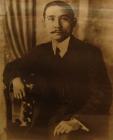
4
During the years of the Emperor's imprisonment, the Emperor Protection Society gained a considerable following, particularly amongst overseas Chinese in North America. Based in Victoria, B.C., fundraising campaigns led by Kang Yuwei proclaimed the need to make China a modern nation, appealing to nostalgic and nationalistic feelings. Unfortunately, the Emperor died in 1908, leaving the society without its impetus, but setting the stage for Dr. Sun Yat-Sen.
5
Letter from Sun Yat-Sen
10 November 1909
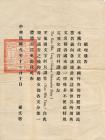
6
Dr. Sun Yat-Sen was educated in Hawaii and Hong Kong where he developed the principles of Democracy, Nationalism and Socialism that would guide the republic he promised to establish. In 1883, after being expelled from his village in China for his overly radical ideas, and then from the entire country of China in 1895 for a failed uprising, he traveled extensively throughout Japan, Southeast Asia, North America and Europe. His underlying premise was political: the overthrow of the Manchu Dynasty and the establishment of a new republic. His travels were always with politics and fundraising in mind.
7
Support for Sun Yat-Sen and the Nationalist movement in China came largely from overseas Chinese, who were greatly motivated by the desire to revive China as a world power. In Canada, chapters of the Nationalist Party could be found in numerous Chinatowns. Moose Jaw's records of local Nationalist Party involvement date from the 1920s and 30s.
8
Chinese Nationalist Party membership book
1900
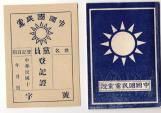
9
In a box found in the basement of the 37/39 building on River Street (before being demolished in 1981), membership cards, buttons, constitutions and account books indicate the political beliefs and hopes of confectionary owners, cooks and restauranteurs. In their many meetings, they would have discussed the latest news on the war's progress, how to further support the movement in China, and how to raise funds and public awareness for the Chinese Nationalist cause.
10
Nationalist pin
1900
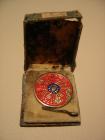
11
Wedding picture of Charlie and Mary Chow
13 October 1910

12
Charlie Chow was a particularly staunch Nationalist and his daughter Helen Paterson remembers that party meetings would be held in the basement of a hotel in River Street. Her Father's reaction in the 1930s, after Japan had invaded Manchuria, was passionate and proactive: "My dad made us all wear these great big buttons, ‘Boycott Japan!' And he made us wear them to school. And it was very humiliating, you know, because at that time no one knew the Japanese might be bad guys. They were in everything, their trade was so strong. He fought a very lone battle trying to boycott the Japanese thing […] Well then, when the Japanese had succeeded in Pearl Harbour, there was a big change in attitude. My dad felt very vindicated, of course."
13
Charlie Chow's family with Dr. Sheu
1929
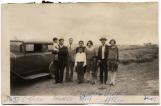
14
At the time, because of the difficulty of travel, China and Japan would have been considered much further away from Moose Jaw and Canada than it is today; nobody would have understood this as well as men like Charlie Chow, who had made the long voyage over in his youth. But this did not weaken their attachment to the country of their birth in spiritual, cultural or, as in the case of their support for the Nationalist cause, political terms.